Eco-Friendly Policy

Eco-Friendly Policy
Atomy strives to reduce our environmental impact in
all business activities. In our products, we implement policies to
manage environmental and social issues according to
the principles of our consumers and stakeholders.
- Production
- sale
- Consumption
- Disposal
- Recycling
Commitment to Recycling and Saving Resources
In accordance with Articles 16 and 18 of the Enforcement Rule on the Promotion of Saving and Recycling of Resources, Atomy participates in the following:
-
- Joined Korea Packaging Recycling Cooperative (2013)
-
- Submitting Shipping & Import Performance Reports for our products and packaging to the Korea Environment Corporation
-
- Application
to batteries and four types of packaging materials: paper, metal cans, glass bottles, synthetic resins
-
- Ensuring that manufacturers fulfill the recycling obligation
The company must pay a recycling fee to the Recycling Cooperative.
-
- Joined Korea Electronics Recycling Cooperative (2019)
Recycling batteries, electronic products, and automobiles in accordance with regulations
-
- Implementing EPR (Extended Producer Responsibility)
EPR : Manufacturers are responsible for collecting or recycling a certain amount of waste from their products and packaging, and pay a fee for any excess to the Recycling Cooperative.
-
- Sharing information about EPR with partnering companies to raise awareness
Ensuring that manufacturers fulfill the recycling obligation - The company must pay a recycling fee to the Recycling Cooperative.
Efforts to Cut Environmental Costs in Managing Waste
Atomy is cutting environmental costs by decreasing waste produced during the manufacturing and distribution process in accordance with Article 10 of the Enforcement Rule on the Promotion of Saving and Recycling of Resources. Atomy also tries to efficiently collect and deal with waste that is produced. Since 2013, Atomy has paid fees for any excess waste to the Korea Environment Corporation who uses the funds for the purchase and stocking of recyclable resources, projects for recycling waste, installation and support for waste processing facilities, R&D for efficient recycling and decrease of waste, and other related expenses.
Examples of Environmental Upgrades
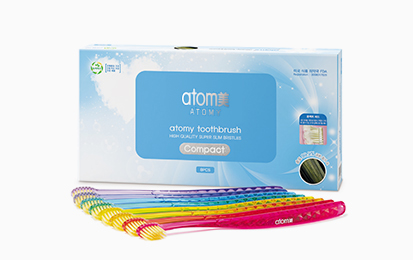 Applied for paper packaging designation
Atomy toothbrushes and compact toothbrushes, batteries, black pepper, etc.
Applied for paper packaging designation
Atomy toothbrushes and compact toothbrushes, batteries, black pepper, etc.
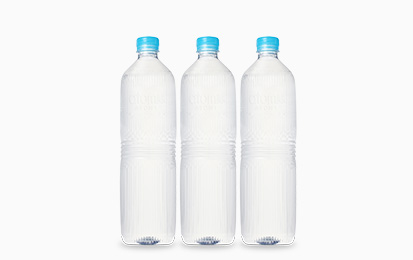 Revamped by replacing PET container with more easily recyclable material and removing label
Atomy Deep Sea Water
Revamped by replacing PET container with more easily recyclable material and removing label
Atomy Deep Sea Water
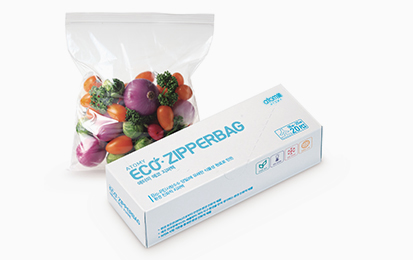 Products with Environmental Mark Certification: Eco-friendly zipper bags made from plant-based Bio-PE (biopolyethylene made from sugar cane) by Ecomass Korea
zipper bags, eco-wrap, sanitary gloves
Products with Environmental Mark Certification: Eco-friendly zipper bags made from plant-based Bio-PE (biopolyethylene made from sugar cane) by Ecomass Korea
zipper bags, eco-wrap, sanitary gloves

Eco Design
The key to our eco-friendly policy is to make long-lasting products to begin with, and then recycle those products to conserve resources. Atomy provides products in consideration of cost saving, enhancing productivity, and environment-friendliness.
Strategic Direction
-
Vision
An Eco-Friendly Atomy Brand
-
Ultimate Goal
Increase sales by appealing to diverse groups
-
Strategic Direction
-
- Reflect on Trends
- Developing products in line with current consumer trends
-
- Reduce Costs
- Using eco-friendly materials and relevant technology
-
- Use Eco-Friendly Materials
- Holding promotions to address environmental issues
-
-
Strategic Tasks
- Draw in younger consumers
- Save environmental costs by decreasing containers' size
- Apply varying marketing points to promote sales
Packaging Direction (Product Renewal & Packaging)
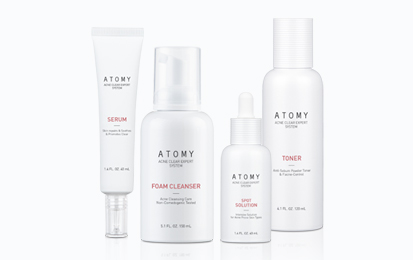 Renewal of cosmetic containers
Use single containers
Renewal of cosmetic containers
Use single containers Consider appropriate size of product containers
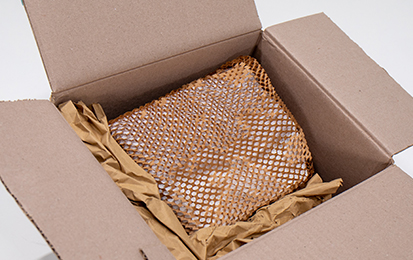 Paper buffer used
Suitable paper type estimation reviewed
Paper buffer used
Suitable paper type estimation reviewed Shipping test reviewed
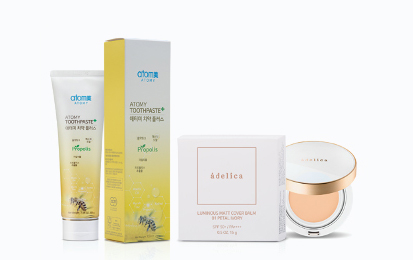 Eco-friendly paper package used
Eco-friendly NEO CCP R30 paper used
Eco-friendly paper package used
Eco-friendly NEO CCP R30 paper used
Implementation Status
-
- Change in materials for cosmetics set box (PVC → PS)
Restrictions for PVC packaging (Ministry of Environment)
-
- Change in packing material (vinyl → paper)
Decrease use of vinyl and change to recyclable paper
-
- Change in materials for shopping bags (vinyl → non-woven fabric)
Decrease use of vinyl and change to non-woven fabric
-
- Structure of paper containers
Recyclable by changing to paper containers
-
- Proper set box design
Decrease damage by minimizing air space in box
-
- Use of shrink film
Recyclable by using PET shrink film
-
- Change in cosmetics packaging ( dual parts container -> single container) for 21 products
Decrease overall packaging and use of plastic
-
- Released using Tetra Pak paper
Changed from aluminum can to Tetra Pak
Status of Redesigned Cosmetics Containers
Total 9,212,611 bottles
- Renewal
- Products
- Produced yearly (bottles)
- February 2019
- Atomy Skincare 6 System
- 5,117,004
- April 2019
- Atomy Men's
- 876,570
- May 2019
- Atomy Aqua Moisture Set
- 306,735
- June 2019
- Calming & AC Care Set
- 376,374
- January 2020
- Atomy Absolute CellActive Skincare
- 2,535,928
Annual production count, including individual products (in 2018)
The information above is based on Atomy Korea Headquarters.





